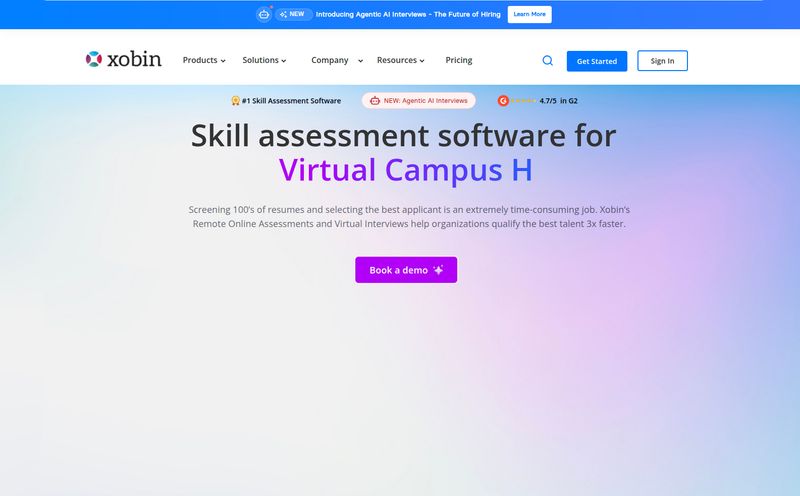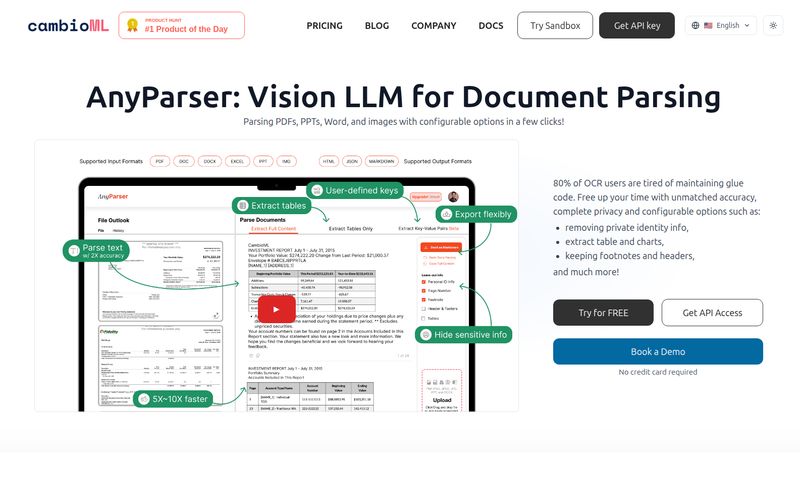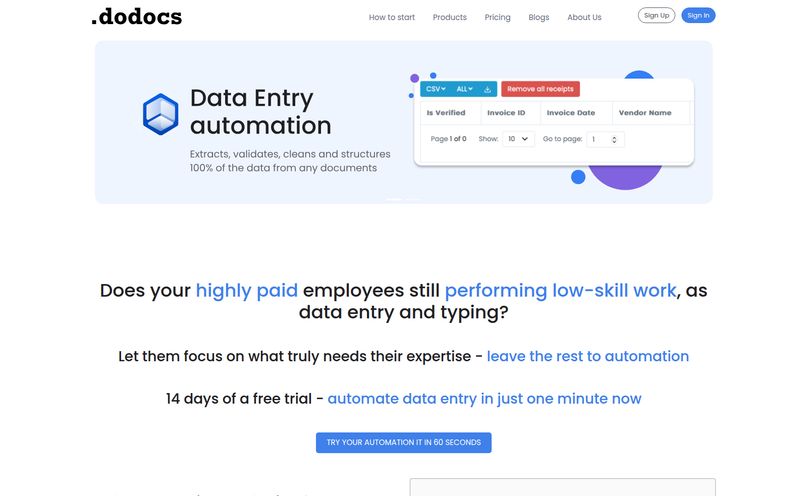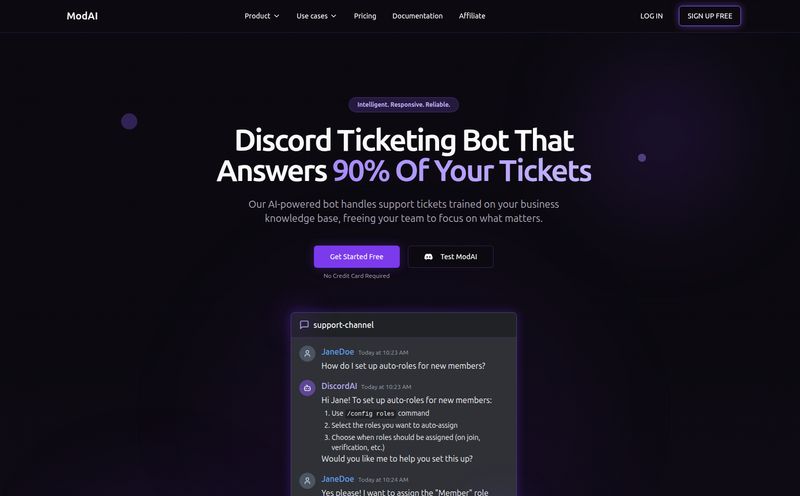Alright, let’s talk. I’ve been in the digital marketing and tech space for a while now, and if there's one thing I’ve seen more times than I can count, it's a hype cycle. Remember the metaverse? Blockchain everything? Well, right now we’re smack in the middle of the GenAI tsunami. And while the tech is genuinely mind-blowing, the way most companies are building with it feels… a bit like the Wild West.
Everyone is rushing to slap a GPT wrapper on something and ship it. Fast. But as the saying goes, move fast and break things. Except when you’re dealing with AI that interacts with real customers, “breaking things” can mean reputational damage, hemorrhaging users, or worse. There's this massive, terrifying gap between a cool demo on a developer's laptop and a reliable, safe, enterprise-grade application. So, I'm always a little skeptical when a new platform pops up claiming to solve all this.
Enter Autoblocks. I stumbled across them recently, and my initial reaction was, “Here we go again.” But the more I looked, the more I felt that familiar tingle of... oh, wait, they actually get it. They seem to understand that shipping reliably matters more than just shipping fast.
What Exactly is Autoblocks? (And Why Should You Care?)
So what is this thing? In the simplest terms, I’d call Autoblocks a scaffolding for your GenAI project. It’s a dedicated platform designed to help teams build, test, and deploy AI applications with confidence. Think of it like the DevOps or MLOps pipelines we’ve had for years in traditional software and machine learning, but purpose-built for the weird, wonderful, and often unpredictable world of generative AI.
The core idea is to move your AI development from a chaotic mess of notebooks, spreadsheets, and Slack messages into a structured, collaborative workspace. The image on their own site paints a pretty clear picture: Without a tool like this, you’re stuck in a nightmare loop of manually gathering user feedback, trying to reproduce bugs, and tweaking prompts with your fingers crossed. It’s slow, inefficient, and frankly, a recipe for disaster.

Visit Autoblocks AI
With a system like Autoblocks, the process becomes a clean, continuous loop. You get real-world data, automated testing, and a clear path from a problem to a deployed solution. It’s about adding guardrails to the AI playground, so you can let your team experiment without driving the entire product off a cliff.
The Core Features That Actually Matter
Any platform can throw a list of features on a landing page. But having built and managed teams shipping products, I look for the features that solve the real, hair-pulling-out problems. Here’s what stood out to me.
Bridging the Gap Between Developers and Experts
This is the big one. Their focus on “SME-aligned eval metrics” isn’t just marketing fluff; it’s a solution to one of the biggest headaches in building specialized AI. Your developers are brilliant at writing code, but do they understand the nuances of medical diagnostics? Or the specific compliance language needed for legal contracts? Probably not.
And your Subject Matter Experts (SMEs)—the doctors, lawyers, the financial analysts—they know their field inside and out, but they can't debug a Python script. Autoblocks acts as a digital translator. It creates a space where SMEs can define what “good” looks like in plain English, and the system turns that into concrete tests the developers can build against. This alone is a game-changer for any serious AI application.
Testing That Isn't Just Wishful Thinking
How do you test something that’s non-deterministic by nature? That's the million-dollar question with LLMs. Autoblocks tackles this with things like dynamic test case generation and red-teaming tools. It’s not just about checking if the code runs; it's about actively trying to break the AI's logic.
Think of it as hiring a team of slightly malicious—but very helpful—robots to throw every weird, unexpected, and borderline-abusive prompt at your AI before a real user does. This is how you find the edge cases that lead to embarrassing public failures. You simulate the chaos so you can handle it gracefully in the real world.
Compliance Isn’t Just a Buzzword Here
When I saw HIPAA & SOC 2 Type 2 compliance, my ears perked up. For 90% of the fun AI toys out there, this doesn’t matter. But for any company that wants to sell into healthcare, finance, or any serious enterprise, this is a non-negotiable. Being able to offer a HIPAA Business Associate Agreement (BAA) means they're putting their money where their mouth is on security and data privacy. It signals that Autoblocks isn't a startup toy; it’s a platform built for serious, regulated industries.
The Autoblocks Workflow in Practice
So how does it all fit together? Their workflow is broken down into a pretty logical five-step cycle:
- Connect: First, you hook Autoblocks into your live application. It traces real-world user interactions, giving you a ground-truth look at how people are actually using your AI, not just how you think they're using it.
- Test: Using that real-world data, you and your SMEs compose dynamic test cases. You're not just guessing what to test anymore; you're building tests based on actual usage patterns, both good and bad.
- Align: This is that magic I mentioned earlier. The test results are evaluated against the criteria set by your Subject Matter Experts. The whole team gets a single dashboard showing what’s working, what’s not, and why, all in a common language.
- Iterate: Armed with clear, actionable feedback, your developers can now go in and make changes to the prompts, the configurations, or even the underlying code with a high degree of confidence. No more shooting in the dark.
- Deploy: You ship the changes. And because you’ve gone through this rigorous loop, you can do it without that pit in your stomach, knowing it's been battle-tested.
So, How Much Does This AI Safety Net Cost?
Ah, the all-important question of price. For a while, I couldn't find it on their site which is a pet peeve of mine, but I did manage to dig up their pricing structure. It seems pretty straightforward.
| Plan | Price | Key Features |
|---|---|---|
| Startup | $199 / month | 5 GB data, 50,000 evals, 3 users |
| Growth | $799 / month | 20 GB data, 100,000 evals, 10 users |
| Enterprise | Custom | HIPAA BAAs, on-prem deployment, premium support |
My take? The pricing feels right for the target market. The Startup plan is accessible enough for a small, funded team trying to find product-market fit without breaking the bank. The Growth plan is for when you've got traction and need to scale your team and your testing efforts. And the Enterprise plan is the full package for big companies with deep pockets and even deeper compliance needs.
Is it worth it? Well, compare $800 a month to the cost of one major AI PR disaster. It’s an insurance policy as much as it is a development tool.
The Not-So-Shiny Bits: A Realistic Look
No tool is perfect, and it's important to be realistic. This isn't some magic wand you wave at your code.
First, any tool this integrated will require some initial setup and effort. You have to connect your stack, get your team onboarded, and define your evaluation frameworks. This isn't a one-click install, it’s a professional toolset that requires a comitment to use properly.
Second, you need to have a certain level of maturity in your process already. The platform requires an understanding of AI testing methodologies. If your team has never even thought about what an “evaluation metric” is, you might have some learning to do first. Autoblocks is for teams who are already feeling the pain of scaling, not for absolute beginners just tinkering with an API for the first time.
Frequently Asked Questions about Autoblocks
Do you offer discounts for startups and nonprofits?
The pricing page doesn't state it explicitly, but most B2B SaaS companies in this space do. If you're an early-stage startup or a nonprofit, I would absolutely reach out to their sales team and ask. The worst they can say is no.
What are the deployment options?
It’s primarily a cloud-based platform. However, for Enterprise customers, they offer on-premise deployments, which is critical for organizations with strict data residency or security requirements.
Do you sign HIPAA BAAs?
Yes, but it's an Enterprise-tier feature. This is standard practice and a huge green light for anyone looking to build AI products for the healthcare industry.
How is it designed for developers AND SMEs?
It's designed with two interfaces in mind. A technical one for developers to integrate with their codebase and CI/CD pipelines, and a more intuitive, qualitative one for Subject Matter Experts to provide feedback and define success without needing to code.
Is Autoblocks just for large language models (LLMs)?
While its features are perfectly suited for the challenges of LLMs, the term they use is "GenAI." This suggests it's built to handle a broader range of generative models. The core principles of tracing, testing, and evaluating apply to many types of AI systems.
Can I integrate this with my existing CI/CD pipeline?
Yes. The whole point of a tool like this is to fit into a modern development workflow. The ability to integrate with your existing stack is a core feature, allowing you to automate testing and evaluation as part of your regular deployment process.
Final Thoughts: Taming the AI Frontier
Look, the race to build the next great AI application is on. But the winners won’t be the ones who get there fastest; they’ll be the ones who build something that people can actually trust and rely on. The era of treating GenAI like a magical black box is coming to an end.
Tools like Autoblocks represent the maturation of the industry. They're the necessary—if slightly less glamorous—plumbing that allows us to build skyscrapers instead of just mud huts. It’s not a tool for every hobbyist, but for professional teams building serious products, it provides a much-needed framework for quality, safety and collaboration.
For my money, if you're a team lead or product manager losing sleep over your AI's reliability, this is definitely something you should be looking at. It might just be the thing that helps your team move from building clever voodoo to shipping enterprise-grade software.



